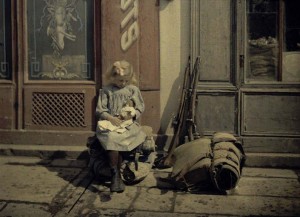Bang! Crash! Tinkle! Tinkle! It’s still pitch black outside, but I quickly get up. I grabbed my little sister, asleep in the bed beside me. We stumble out the bedroom door, quickly following Mommy down the stairs. “Hurry, hurry,” she tells us, “The Germans are here.” We hurry into the basement, where we wait until it is quiet again.
During World War I, a girl in Britain might have been woken up quite suddenly. Her whole life had changed within months of the war’s start – her father was gone to fight, her mother had begun working, and the bombs were sounds she would never forget.
Every day, she would wake up. Her mother was already gone to work, so she would need to get herself and her little sister ready for school. Their breakfast was small, and not nearly as good as what it had been before the war. Food was scarce now. They needed it for the soldiers.
They would go to school, sitting on long, wooden benches with desks fixed in front for the majority of the day. The teacher sat up front, writing lessons on the chalkboard and trying to keep the schoolroom heated with a small coal stove. The school would serve her dinner, a meager meal that she hardly liked – but it was some of the only food she got.
After school, she would help in the Girl Guides. They raised funds, made bandages, and sewed clothing for the soldiers. Sometimes she hoped the mittens she made would reach her father before his fingers froze. She would go home, helping tend the garden and watch her little sister. Sometimes she would get to play outside with her friends, always with a watchful eye towards the sky.
For more information on children’s experiences in World War I, visit this BBC site.
-Tiffany Rhoades
Junior Girl
Girl Museum Inc.

